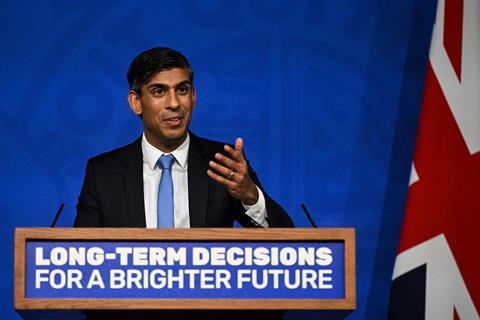Environmental law experts weren’t shooting from the hip this week as prime minister Rishi Sunak junked key parts of the government’s existing climate change policies.
They have perhaps noticed that with this government, the policies might not even be headline driven. Instead, the headline might be the policy. As the Gazette reported earlier this month, that’s the case with its immigration and asylum policy, which is unworkable.
So environment lawyers have taken the time to check through what detail is available, and given their verdict today.
Having slept on it, they find the policies alarming. The lack of consistency and predictability in policy is bad for their business and investor clients. The government will be in court over key elements. And not least, there is the matter of the need to cut carbon emissions and move towards ‘net zero’.

The Bar Council was first to publish its assessment. ‘Many people in the legal community are concerned that the UK government is rolling back key elements of the policies introduced to meet the legally mandated carbon budgets and the legal requirement to achieve net zero by 2050,’ its Climate Crisis Working Group co-chairs Estelle Dehon KC and Ben Cooper KC said.
They continued: ‘Sudden changes in these policies create uncertainty and result in a loss of confidence in clear government policy statements.’
The government, Dehon and Cooper pointed out, has relied on policies now reversed ‘in public and before the courts’.
‘It is likely,’ said Caroline May, sustainability partner at Norton Rose Fulbright and chair of the Law Society’s Climate Change Working Group, ‘that there may be legal challenges to the government’s recent U-turn on the UK’s net zero commitments.’
The timeline shift announced by Sunak also seems to put policy out of kilter with the Paris Agreement, as our 2030 goals are booted on.
As Dehon and Cooper put it: ‘The government has relied on these policies to demonstrate how it will meet its international commitment under the Paris Agreement to reduce economy-wide greenhouse gas emissions by at least 68% by 2030, compared to 1990 levels.’
‘The Climate Change Act 2008 also sets legally binding targets for the UK government to hit net zero by 2050, which made the UK the first major economy to do so,’ May pointed out. ‘The next report due to the independent climate change committee, as established by the Act, will be published in October. Weakening key elements of the policies introduced to meet these key legally binding targets may impact the report and delivery of the targets, as these policies have been used as evidence both by the courts, investors and the public that the government would keep true to its commitments.’
Of course, businesses and wider society in many instances are pushing ahead with decarbonising because they believe it is the right and urgent thing to do.
These include institutions well known to Sunak. Winchester College, where he was a pupil, gets 100% of its electricity from renewable sources, purchased its first electric vehicles, and engaged advisers to accelerate its path to net zero.
Another, Lincoln College, Oxford, where the prime minister was an undergraduate, reports it is on course to be by ‘carbon neutral’ by 2035.
But lawyers worry about the unstable context for such efforts that a lack of leadership on environmental policy is now creating.
As May put it: ‘It will also likely impact investor confidence in the green economy where certainty of government policy and commitment is seen as key, threatening the UK’s leadership on this issue and the economic opportunities that come with it. It also affects legal advisors’ abilities to advise clients on these issues.’
In a similar vein, Dehon and Cooper conclude: ‘There is also widespread concern that industries, local authorities and individuals have acted on the policy commitments and announced dates, and made financial and administrative decisions accordingly.’
If headlines were the aim, the prime minister might be disappointed with the Financial Times, whose front page leads with the headline: ‘Sunak sparks business backlash after U-turn on net zero pledges.’
I’ve wondered why business’s need for consistency on government policy is so little understood, when many in the cabinet, the prime minister included, are proud of their time in the private sector.
Could it be because Sunak’s experience of business concerns investment banking’s transactional activities – and because hedge funds, now so close to the Conservative party, and over represented among its donors, make money from arbitrage and see opportunity in lightly regulated chaos.
None of which is closely connected enough to efforts to actually make something - like cars that can be powered with electricity generated by windmills. Which could explain why lawyers looking at the government’s new environmental policy suite feel such palpable exasperation on behalf of their clients.
This article is now closed for comment.




































7 Readers' comments